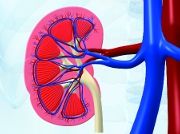Article
New Drug Class More Effective Than Current Kidney Cancer Treatments
Author(s):
HIF-2 inhibitors may be better tolerated and more effective in kidney cancer.

A HIF-2 inhibitor was found to control the cancer in half the tumors of mice transplanted with kidney cancer, a new study published in Nature found.
Hypoxia-inducible factors (HIFs), such as HIF-2, are necessary because they allow cells to adjust to low-oxygen environments. HIFs activate programs that promote the development of blood vessels, facilitate oxygen delivery, and promote efficient nutrient utilization.
Unfortunately, this same system is hijacked by cancer kidney cells in order to fuel their growth. HIF-2 inhibitors come into play because they are designed to suppress the effects of HIF-2, which includes the downregulation of the protein VEGF that promotes blood vessel formation needed for tumors to grow.
“Unlike existing VEGF inhibitors, the HIF-2 inhibitor blocks VEGF only in the cancer and therefore does not cause cardiac toxicity or hypertension,” said senior study author James Brugarolas.
For the new study, researchers wanted to compare the HIF-2 inhibitor PT2399 to sunitinib. They found that PT2399 was more active than sunitinib, and that it was active against tumors progressing on sunitinib.
“Furthermore, it was also better tolerated,” Brugarolas said. “As sometimes happens in patients, mice on sunitinib were sickly and lost weight, whereas mice on PT2399 gained weight while on the study.”
Although researchers were surprised to find a subset of tumors that did not respond to the drug, they were able to identify biomarkers that, once verified, would help determine which patients are more likely to benefit from these HIF-2 therapies.
“HIF-2 is believed to be the most important driver of kidney cancer,” Brugarolas said. “Traditionally, proteins like HIF-2 were disregarded as drug targets because their shape made it nearly impossible to design drugs against them. The approaches we have taken pave the way for identifying drug candidates for other proteins that have traditionally been considered undruggable.”
Researchers also found that HIF-2 seemed to be significant in other types of cancer, including glioblastomas and non-small cell lung cancer.
“This is a completely new treatment for kidney cancer,” Brugarolas said. “We want to make HIF-2 inhibitors available to patients and are currently carrying out clinical trials.”
The findings suggest that HIF-2 could be a promising target for treating kidney cancer in the future, the researchers concluded.
Newsletter
Stay informed on drug updates, treatment guidelines, and pharmacy practice trends—subscribe to Pharmacy Times for weekly clinical insights.





